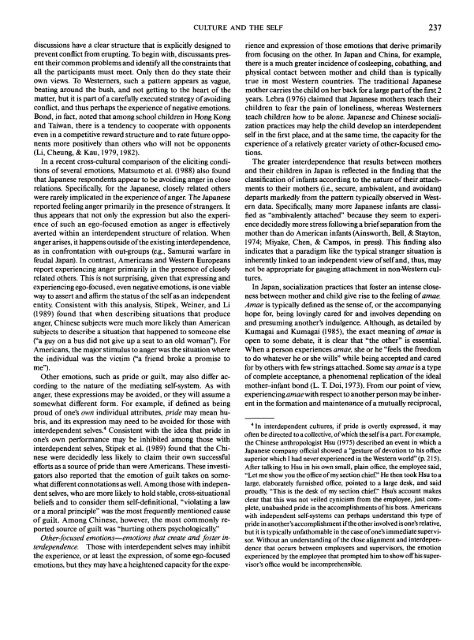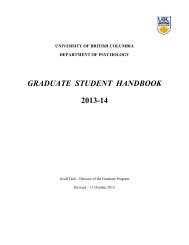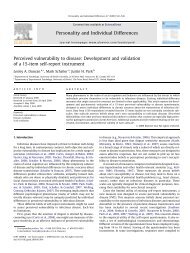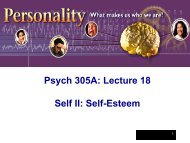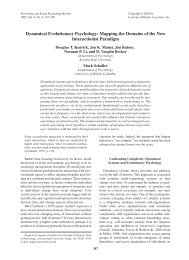Culture and the Self: Implications for Cognition, Emotion, and ... - iacmr
Culture and the Self: Implications for Cognition, Emotion, and ... - iacmr
Culture and the Self: Implications for Cognition, Emotion, and ... - iacmr
You also want an ePaper? Increase the reach of your titles
YUMPU automatically turns print PDFs into web optimized ePapers that Google loves.
CULTURE AND THE SELF 237<br />
discussions have a clear structure that is explicitly designed to<br />
prevent conflict from erupting. To begin with, discussants present<br />
<strong>the</strong>ir common problems <strong>and</strong> identify all <strong>the</strong> constraints that<br />
all <strong>the</strong> participants must meet. Only <strong>the</strong>n do <strong>the</strong>y state <strong>the</strong>ir<br />
own views. To Westerners, such a pattern appears as vague,<br />
beating around <strong>the</strong> bush, <strong>and</strong> not getting to <strong>the</strong> heart of <strong>the</strong><br />
matter, but it is part of a carefully executed strategy of avoiding<br />
conflict, <strong>and</strong> thus perhaps <strong>the</strong> experience of negative emotions.<br />
Bond, in fact, noted that among school children in Hong Kong<br />
<strong>and</strong> Taiwan, <strong>the</strong>re is a tendency to cooperate with opponents<br />
even in a competitive reward structure <strong>and</strong> to rate future opponents<br />
more positively than o<strong>the</strong>rs who will not be opponents<br />
(Li, Cheung, & Kau, 1979,1982).<br />
In a recent cross-cultural comparison of <strong>the</strong> eliciting conditions<br />
of several emotions, Matsumoto et al. (1988) also found<br />
that Japanese respondents appear to be avoiding anger in close<br />
relations. Specifically, <strong>for</strong> <strong>the</strong> Japanese, closely related o<strong>the</strong>rs<br />
were rarely implicated in <strong>the</strong> experience of anger. The Japanese<br />
reported feeling anger primarily in <strong>the</strong> presence of strangers. It<br />
thus appears that not only <strong>the</strong> expression but also <strong>the</strong> experience<br />
of such an ego-focused emotion as anger is effectively<br />
averted within an interdependent structure of relation. When<br />
anger arises, it happens outside of <strong>the</strong> existing interdependence,<br />
as in confrontation with out-groups (e.g., Samurai warfare in<br />
feudal Japan). In contrast, Americans <strong>and</strong> Western Europeans<br />
report experiencing anger primarily in <strong>the</strong> presence of closely<br />
related o<strong>the</strong>rs. This is not surprising, given that expressing <strong>and</strong><br />
experiencing ego-focused, even negative emotions, is one viable<br />
way to assert <strong>and</strong> affirm <strong>the</strong> status of <strong>the</strong> self as an independent<br />
entity. Consistent with this analysis, Stipek, Weiner, <strong>and</strong> Li<br />
(1989) found that when describing situations that produce<br />
anger, Chinese subjects were much more likely than American<br />
subjects to describe a situation that happened to someone else<br />
("a guy on a bus did not give up a seat to an old woman"). For<br />
Americans, <strong>the</strong> major stimulus to anger was <strong>the</strong> situation where<br />
<strong>the</strong> individual was <strong>the</strong> victim ("a friend broke a promise to<br />
me").<br />
O<strong>the</strong>r emotions, such as pride or guilt, may also differ according<br />
to <strong>the</strong> nature of <strong>the</strong> mediating self-system. As with<br />
anger, <strong>the</strong>se expressions may be avoided, or <strong>the</strong>y will assume a<br />
somewhat different <strong>for</strong>m. For example, if defined as being<br />
proud of one's own individual attributes, pride may mean hubris,<br />
<strong>and</strong> its expression may need to be avoided <strong>for</strong> those with<br />
interdependent selves. 4 Consistent with <strong>the</strong> idea that pride in<br />
one's own per<strong>for</strong>mance may be inhibited among those with<br />
interdependent selves, Stipek et al. (1989) found that <strong>the</strong> Chinese<br />
were decidedly less likely to claim <strong>the</strong>ir own successful<br />
ef<strong>for</strong>ts as a source of pride than were Americans. These investigators<br />
also reported that <strong>the</strong> emotion of guilt takes on somewhat<br />
different connotations as well. Among those with independent<br />
selves, who are more likely to hold stable, cross-situational<br />
beliefs <strong>and</strong> to consider <strong>the</strong>m self-definitional, "violating a law<br />
or a moral principle" was <strong>the</strong> most frequently mentioned cause<br />
of guilt. Among Chinese, however, <strong>the</strong> most commonly reported<br />
source of guilt was "hurting o<strong>the</strong>rs psychologically"<br />
O<strong>the</strong>r-focused emotions—emotions that create <strong>and</strong> foster interdependence.<br />
Those with interdependent selves may inhibit<br />
<strong>the</strong> experience, or at least <strong>the</strong> expression, of some ego-focused<br />
emotions, but <strong>the</strong>y may have a heightened capacity <strong>for</strong> <strong>the</strong> experience<br />
<strong>and</strong> expression of those emotions that derive primarily<br />
from focusing on <strong>the</strong> o<strong>the</strong>r. In Japan <strong>and</strong> China, <strong>for</strong> example,<br />
<strong>the</strong>re is a much greater incidence of cosleeping, cobathing, <strong>and</strong><br />
physical contact between mo<strong>the</strong>r <strong>and</strong> child than is typically<br />
true in most Western countries. The traditional Japanese<br />
mo<strong>the</strong>r carries <strong>the</strong> child on her back <strong>for</strong> a large part of <strong>the</strong> first 2<br />
years. Lebra (1976) claimed that Japanese mo<strong>the</strong>rs teach <strong>the</strong>ir<br />
children to fear <strong>the</strong> pain of loneliness, whereas Westerners<br />
teach children how to be alone. Japanese <strong>and</strong> Chinese socialization<br />
practices may help <strong>the</strong> child develop an interdependent<br />
self in <strong>the</strong> first place, <strong>and</strong> at <strong>the</strong> same time, <strong>the</strong> capacity <strong>for</strong> <strong>the</strong><br />
experience of a relatively greater variety of o<strong>the</strong>r-focused emotions.<br />
The greater interdependence that results between mo<strong>the</strong>rs<br />
<strong>and</strong> <strong>the</strong>ir children in Japan is reflected in <strong>the</strong> finding that <strong>the</strong><br />
classification of infants according to <strong>the</strong> nature of <strong>the</strong>ir attachments<br />
to <strong>the</strong>ir mo<strong>the</strong>rs (i.e., secure, ambivalent, <strong>and</strong> avoidant)<br />
departs markedly from <strong>the</strong> pattern typically observed in Western<br />
data. Specifically, many more Japanese infants are classified<br />
as "ambivalently attached" because <strong>the</strong>y seem to experience<br />
decidedly more stress following a brief separation from <strong>the</strong><br />
mo<strong>the</strong>r than do American infants (Ainsworth, Bell, & Stayton,<br />
1974; Miyake, Chen, & Campos, in press). This finding also<br />
indicates that a paradigm like <strong>the</strong> typical stranger situation is<br />
inherently linked to an independent view of self <strong>and</strong>, thus, may<br />
not be appropriate <strong>for</strong> gauging attachment in non-Western cultures.<br />
In Japan, socialization practices that foster an intense closeness<br />
between mo<strong>the</strong>r <strong>and</strong> child give rise to <strong>the</strong> feeling ofamae.<br />
Amae is typically defined as <strong>the</strong> sense of, or <strong>the</strong> accompanying<br />
hope <strong>for</strong>, being lovingly cared <strong>for</strong> <strong>and</strong> involves depending on<br />
<strong>and</strong> presuming ano<strong>the</strong>r's indulgence. Although, as detailed by<br />
Kumagai <strong>and</strong> Kumagai (1985), <strong>the</strong> exact meaning of amae is<br />
open to some debate, it is clear that "<strong>the</strong> o<strong>the</strong>r" is essential.<br />
When a person experiences amae, she or he "feels <strong>the</strong> freedom<br />
to do whatever he or she wills" while being accepted <strong>and</strong> cared<br />
<strong>for</strong> by o<strong>the</strong>rs with few strings attached. Some say amae is a type<br />
of complete acceptance, a phenomenal replication of <strong>the</strong> ideal<br />
mo<strong>the</strong>r-infant bond (L. T. Doi, 1973). From our point of view,<br />
experiencing amae with respect to ano<strong>the</strong>r person may be inherent<br />
in <strong>the</strong> <strong>for</strong>mation <strong>and</strong> maintenance of a mutually reciprocal,<br />
4 In interdependent cultures, if pride is overtly expressed, it may<br />
often be directed to a collective, of which <strong>the</strong> self is a part. For example,<br />
<strong>the</strong> Chinese anthropologist Hsu (1975) described an event in which a<br />
Japanese company official showed a "gesture of devotion to his office<br />
superior which I had never experienced in <strong>the</strong> Western world" (p. 215).<br />
After talking to Hsu in his own small, plain office, <strong>the</strong> employee said,<br />
"Let me show you <strong>the</strong> office of my section chief." He <strong>the</strong>n took Hsu to a<br />
large, elaborately furnished office, pointed to a large desk, <strong>and</strong> said<br />
proudly, "This is <strong>the</strong> desk of my section chief." Hsu's account makes<br />
clear that this was not veiled cynicism from <strong>the</strong> employee, just complete,<br />
unabashed pride in <strong>the</strong> accomplishments of his boss. Americans<br />
with independent self-systems can perhaps underst<strong>and</strong> this type of<br />
pride in ano<strong>the</strong>r's accomplishment if <strong>the</strong> o<strong>the</strong>r involved is one's relative,<br />
but it is typically unfathomable in <strong>the</strong> case of one's immediate supervisor.<br />
Without an underst<strong>and</strong>ing of <strong>the</strong> close alignment <strong>and</strong> interdependence<br />
that occurs between employees <strong>and</strong> supervisors, <strong>the</strong> emotion<br />
experienced by <strong>the</strong> employee that prompted him to show off his supervisor's<br />
office would be incomprehensible.


